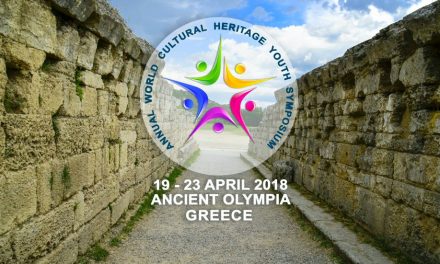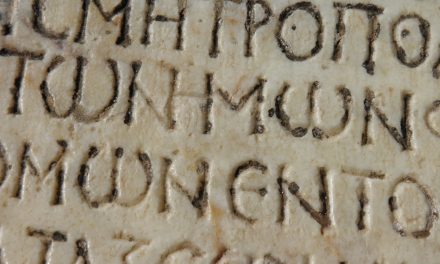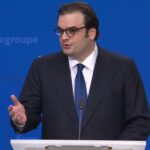The European Society of Modern Greek Studies (ESMGS) co-organises with the Department of Modern Greek Studies at Lund University in Sweden, the 6th European Congress of Modern Greek Studies titled “The Greek World in Periods of Crisis and Recovery, 1204-2018” in Lund, on 4-7 October 2018. The European Congress of Modern Greek studies is a quadrennial event organised by the ESMGS, in various European cities.
Greek News Agenda asked* the President of the European Society of Modern Greek Studies, Professor Konstantinos Dimadis and the Chairman of the 6th Congress organising committee and Vice President of the ESMGS Dr. Vassilios Sabatakakis to share their thoughts on the Congress and the current state of Modern Greek Studies.
Professor Konstantinos Dimadis: The perils for Modern Greek Studies and the need for disciplinary enrichment
Konstantinos A. Dimadis read Classics with Medieval and Modern Greek at the Aristotle University of Thessaloniki and is a Ph.D. holder from the University of Amsterdam. He taught Modern Greek Language, Literature and History at the University of Amsterdam from 1980 until 1992, when he became Professor of Medieval and Modern Greek Language and Literature at the University of Groningen. From 1996 until 2007, he was Professor of Modern Greek at the Freie Universität of Berlin.
Professor Dimadis is Director of the International Summer School for Greek Language, History and Culture (held in Thessaloniki). He is Honorary Professor at the Institute of Classical Philology, Byzantine and Modern Greek Studies at Ivane Javakhishvili Tbilisi State Univerity (Georgia), the holder of an honorary doctorate from the University of Bucharest, and President of the European Society of Modern Greek Studies. His main research focus is the relationship between 19th and 20th century Greek prose fiction and social developments in Greece and Europe, especially during times of political crisis and war.
Bearing in mind the title of the Conference (“The Greek World in Periods of Crisis and Recovery, 1204-2018”), what is the impact of the economic crisis in the field of Social Studies and the Humanities, especially in the field of Modern Greek Studies in European universities?
The discipline of Modern Greek studies which gained high esteem in Europe in the fields of academic teaching and research after World War II and achieved distinguished professorial chairs in top European universities, is nowadays crushed and gradually driven to extinction. There are very few permanent professorial chairs in Modern Greek left in European universities. The “reforms” in European academic education, which have been carried out over the last 15 years for financial reasons, are usually cited as the cause of this unfavourable development.
In short, 14 professorial chairs in Modern Greek studies were abolished in Europe after the year 2000. Among those were some that made history in major European countries in the course of the 20th century, nurturing neo-Hellenists who excelled and/or continue to excel in Greek Universities. Similarly, several acclaimed European departments of Modern Greek Studies are in the process of closing down or are no longer attracting students.
To move on to the second part of the title: Is there any prospect of recovery, and what are the initiatives to be taken both by countries with Departments of Modern Greek Studies as well as by the Greek State?
The current requirements of the independent discipline of Modern Greek Studies at universities outside Greece and Cyprus are radically different to those at Greek Faculties of Philosophy.
European university departments of Modern Greek Studies that are governed by a statute of study, have a full undergraduate and postgraduate program and award PhD degrees (because that is what it is all about), mainly cater to students from their countries, including second- and third-generation Greeks and Cypriots. With their degrees these students are seeking to secure a job in their country of origin. And they succeed in doing so when their university education is sound and responds to current labour market demands.
At the same time –and this is important for Greece–, Greek society needs fellow European citizens that are aware of the problems Greece is currently facing. If students of Modern Greek in Europe today are properly educated on contemporary Greek social issues (and not just literature), they will then become social actors in their countries –wherever they may end up professionally– and form a kind of bridge for the understanding and objective consideration of the issues Greek society faces.
It’s worth noting here that in the past 20 years three personalities appointed heads of diplomatic missions of three European countries in Greece had previously studied Modern Greek at universities abroad and worked in academia.
So please allow me to briefly state my conviction that for Modern Greek studies to survive until 2035 in two or three western European universities there is one vital requirement, namely that the Greek State ensure, with the means at its disposal and those it needs to develop, that we have properly qualified neo-Hellenists from the native student population of every European country in European Universities. The same applies to Modern Greek studies in Eastern Europe.
What is the new reality to which Departments of Modern Greek Studies need to adapt in order to survive?
The issue is of a political nature: In Europe today, students of Modern Greek should be given an as comprehensive as possible education regarding Modern Greek society so that they can put their degree to good use in the labour market. But how many professors of Modern Greek at European universities are historians? Very few, I would say; and I hardly dare refer to other specialties, such as cultural anthropology.
Thus, the crucial question arises as to how many and which undergraduate or postgraduate programs of Modern Greek Studies at universities abroad systematically include a course of Modern Greek history, i.e. a course proven to currently attract students from other disciplines and to make Modern Greek studies competitive.
If, therefore, European programs of Modern Greek Studies are not modernized but remain introverted self-absorbed literary (pseudo-literary) courses, within a decade they’ll have no students and will be abolished. The number of students attracted by each university department is a measure for its longevity or its abolition. This is the case in daily practice.
What are the prospects of Modern Greek Studies at international level?
By its nature and content, the discipline of Modern Greek Studies has an interdisciplinary relation with many academic areas, and as such, Modern Greek Studies is the academic discipline that dynamically opens the way towards dealing with contemporary European and international issues on a wide scale.
Some American universities have successfully expanded and enriched their Modern Greek programs across disciplines, which has resulted in a significant rise in student numbers. Allow me to add that, in my opinion, it is no coincidence at all that a colleague from an American University was recently chosen by the academic committee for the Koraes Chair of Modern Greek & Byzantine History, Language & Literature at the Department of Classics of King’s College in London.
Furthermore, the positive development of Modern Greek studies in China today confirms the importance of these studies internationally. At the “International Summer School for Greek Language, History and Culture“, organized every August in Thessaloniki with the support of the Greek Ministry of Culture and Sports, every year we welcome excellent students from the Universities of Beijing and Shanghai. This year, one Chinese scholarship holder who participated in the higher linguistic level of the Program, is writing her PhD thesis on the Greek civil war.
Professor Dimadis with the scholarship holders of the Hellenic Ministry of Culture and Sports, participants in the 46th International Summer School for Greek Language, History and Culture (Thessaloniki, 2018)
I will also mention that at the Thessaloniki Summer School this year we had four Ministry of Culture and Sports scholarship holders (three male and a female student) from the International University of Moscow. This university is well-known for educating the future Russian officialdom and senior diplomatic officers.
The aboventioned three students, aged 19 to 21, have Greek language and culture as their major (principal area of study) at the International University of Moscow, while the female student is majoring in economy and studies Greek language at a lower level. I would add that the two Russian professors of Greek language and culture at the International University of Moscow have also been scholarship holders of the Ministry of Culture and Sports in the Thessaloniki “International Summer School for Greek Language, History and Culture“. One could list more examples indicative of the importance of promoting Modern Greek Studies.
Would you like to elaborate on the activities of the European Society of Modern Greek Studies?
The European Society of Modern Greek Studies (ESMGS) was founded in Athens in 1995 with the moral and financial support of the Greek Ministry of Culture. It is based in Athens and is a non-profit organisation.
It has a federated structure, with 18 National Societies of Modern Greek Studies (Austria, Bulgaria, Belgium, France, Germany, Georgia, Switzerland, Spain, Italy, United Kingdom, Netherlands, Poland, Romania, Russia, Serbia, Scandinavia, Slovakia and the Czech Republic) as full members.
In its 23 years of activity, the Society has consistently pursued the objectives set out when it was established. Among other things, for the first time after World War II, it systematically organized six international congresses of Modern Greek Studies in six different European university campuses: Berlin (1998), Rethymnon (2002), Bucharest (2006), Granada (2010), Thessaloniki (2014) and Lund (2018). The Society also published the proceedings of its first five congresses, comprising 17 volumes (approximately 12,500 pages).
ESMGS has also taken innovative steps to promote the broader participation of researchers from the fields of economics, sociology and political science in its conferences. Since the very first European Congress of Modern Greek Studies, which we organized 20 years ago in Berlin, in October 1998, we have been fostering interdisciplinarity in independent specialist areas, which constitute the wide range of Modern Greek Studies, both in university teaching and in research.
ESMGS is currently operating as an effective vehicle for the international promotion of Modern Greek Studies, as the vigorous global interest at its quadrennial congresses testifies. It has also substantially contributed to the rescue of Departments of Greek in European universities that were at risk of closing down after 2000.
Last but not least, it promotes young researchers with a view to their professional integration. In this context, it offers them support on matters of scholarships and research programs.
Vassilios Sabatakakis: We aim to outline a strategy for revitalising Modern Greek Studies
Senior Lecturer Vassilios Sabatakakis is the director of Classical and Romanian Studies and member of the Board of the Lund University Centre for Languages and Literature. He is Vice- President of the European Society of Modern Greek Studies.He has done research in the areas of the language and literature of the byzantine poetry, and of the renaissance poetry of Crete.
Since 2015, he is the editor-in-chief of the annual peer review journal Scandinavian Journal of Byzantine and Modern Greek Studies, which was published since 2002 under the title the Scandinavian Journal of Modern Greek Studies. The journal is a collaboration between the Modern Greek department in Lund and the department of Greek at Uppsala University. Dr Sabatakakis has worked on the etymology of words and he has written entries for Swedish encyclopaedias. He has translated Byzantine, Modern Greek and Cypriot literature to the Swedish language.
What is the objective of the 6th European Congress of Modern Greek Studies?
Τhe 6th European Congress of Modern Greek Studies is organised by the European Society of Modern Greek Studies (ESMGS), in association with the Department of Modern Greek Studies at Lund University in Sweden, and the Lund University, one of northern Europe’s oldest universities which ranks among the world’s top 100. We wanted to highlight the importance and specific weight of Modern Greek Studies at university level, in the aftermath of the crisis that Social and Humanitarian Studies undergo across European universities.
At a time when entire university departments across Europe are being closed due to funding shortage or lack of teaching and scientific staff, our objective is to emphasise thedynamic of Modern Greek Language and Literature. To that end, the Congress offers the Departments of the European universities and the neo-Hellenistsan opportunity to get together, talk and jointly outline a strategy for revitalising Modern Greek Studies at universities abroad.
Such a Congress could only benefit our scientific field both at the level of teaching, in undergraduate and postgraduate programs, and at the level of research.
The Department of Modern Greek Studies at Lund University, which has long acknowledged this issue, as it has suffered the effects of the sector’s shrinking, co-organises this Congress with theEuropean Society of Modern Greek Studies (ESMGS), trying to provide an opportunity for discussion on this decline.
We believe that it is high time we discussed in detail the future of Modern Greek Studies in Europe’s universities having as a common ground our shared love and interest for our scientific field and its promotion.
Which is the target audience of the Congress?
The European Society of Modern Greek Studies is aimed at neo-Hellenists, and in particular young researchers, from a broad spectrum within Modern Greek Studies (linguists, philologists, anthropologists, archaeologists, theatrologists, historians, art historians, educational historians, sociologists, musicologists, political scientists, and those engaged in international relations studies, comparative and cultural studies). The 6th Congress’ areas of interest (Greek language, Greek literature, Greek history and historiography, Mass and Social Media, theater and cinema, among others) promote the (comparative) study of the Greek world in the period from 1204 until the present day, within the framework of the general theme of the Congress.
It is a European Congress in which all Modern Greek Studies Departments of the European Universities participate. However all the neo-Hellenists from all over the world are welcome. Neo-Hellenists from US, China and Australia will also participate in this Congress. (See the conference program here)
The Department of Modern Greek Studies at Lund University is the only one left in the Nordic countries. Would you like to tell us a few things about that?
Founded in 1666, Lund University ranks among the world’s top 100 universities and is the leading university of Sweden. The Centre for Languages and Literature, which is part of the Humanities Faculty, was established a decade ago with a view to highlight and deepen the study of classical and modern languages and literature, as well as European and other studies. The Centre offers courses on more than 30 subject areas, employs about 250 employees, and has around 3,000 students.
The Modern Greek Studies Department, which is now part of theCentre for Language and Literature, was founded in 1957. The first who taught in the Department was the neo-Hellenist Antonis Mystakides, who came from Romania. Mystakides inspired Scandinavians to study Modern Greek, leading to the creation of Departments at various Universities in the Nordic countries: Lund, Stockholm, Gothenburg, Uppsala, Copenhagen, Helsinki and Oslo.
Today all of the above have been closed, with the exception of the Department of Lund. In Copenhagen, despite many efforts of the academia (teachers and researchers), the Department was closed in December 2015. The Modern Greek Studies Department at Lund University is financed by the Swedish State, as is the case for all Swedish Universities.
What is the Modern Greek Studies Department curriculum?
The Department of Modern Greek Studies at Lund University offers undergraduate and postgraduate courses both at the Centre for Language and Literature and online. The Department cooperates, under the Erasmus programme, with several Greek universities and has developed a six-year cooperation with the University of Jordan in Amman.
Furthermore, the Department directs, organises, edits and publishes the Scandinavian Journal of Byzantine and Modern Greek Studies, which is a successor to the Scandinavian Journal of Modern Greek Studies. The journal is open for unpublished articles and book reviews related to Byzantine and Modern Greek Studies in the fields of philology, linguistics, history and literature. It is published in collaboration with the Greek and Byzantine Studies Department at Uppsala University and we welcome contributions not only from Scandinavian colleagues, but from scholars all around the world.
* Interviews by Nicky Psychari, Head of Press and Communication Office of the Embassy of Greece in Stockholm, edited by Florentia Kiortsi.
Read also: Rethinking Greece: Dimitris Tziovas on the Greek crisis & the Reinvention of Modern Greek Studies, Reading Greece | Professor Gonda Van Steen on her lifelong fascination with all things Greek, Reading Greece: Jan Henrik Swahn and Rea Ann-Margaret Mellberg on Greek literature in Sweden, Reading Greece: Vassilis Lambropoulos on New Greek Poetry and Modern Greek Studies, Modern Greek Studies: New Journal Launched; Rethinking Greece/Roderick Beaton on the study of Greece and modern Greek achievements; Society for Modern Greek Studies
TAGS: INTERNATIONAL RELATIONS














